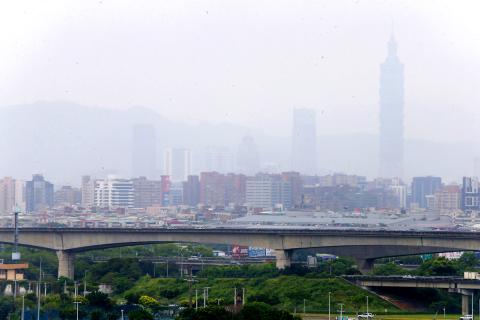The nation’s most serious air pollution since 2012 is expected to improve today with the influence of a sandstorm weakening, an Environmental Protection Administration (EPA) official said yesterday.
The nation’s air quality has worsened since Friday evening when the sandstorm from China’s Gansu Province and Inner Mongolia began to affect Taiwan, EPA Department of Environmental Monitoring and Information Management Director-General Chang Shuenn-chin (張順欽) said.
As of 11am yesterday, the agency’s air quality monitoring station in Yunlin County’s Taisi Township (台西) indicated hazardous air quality levels, which is indicated by the color maroon on the EPA Web site.

Photo: CNA
The key air pollutant in the township was coarse dust particles that measured 10 micrometers in diameter or smaller (PM10).
PM10 concentration soared to 628 micrograms per cubic meter yesterday morning, but dropped to 270 micrograms per cubic meter by 6pm yesterday, EPA data showed.
The poor air quality was caused by dust from the Jhuoshuei River’s (濁水溪) dry banks, which was carried on strong winds, Chang said, adding that local wind speed reached 14 meters per second.
The influence of air pollution from China is expected to diminish following the weakening of northeastern monsoon winds today, Chang said.
Air quality in central Taiwan is less likely to improve, as atmospheric conditions are not conducive to the diffusion of pollutants, Chang added.
However, environmental group Act Clean Taiwan questioned the agency’s claim that the township’s pollution was caused by riverbed dust.
The only monitoring station to indicate hazardous levels was in the industrial area of Taisi, the group said, adding that other monitoring stations in the township should have also hit hazardous levels if the dust was the cause of the pollution.
Meanwhile, Tri-Service General Hospital Ophthalmology Department director Lu Da-wen (呂大文) said the hospital has seen an increase of outpatient visits for eye swelling complaints.
“People should avoid rubbing their eyes, or more particles could get into the eyes and break the small blood vessels within, causing subconjunctival hemorrhage,” he said, adding that people can use an antihistamine solution or a wet towel to alleviate discomfort.
“People should avoid outdoor activities when air quality is poor, but if it is unavoidable, people should wear glasses or goggles while outside,” he said, adding that wearing contact lenses could attract pollutants.
People who have allergies, asthma or who are using eye drops to treat glaucoma or macular degeneration should be on high alert during a sandstorm, Lu said.
Additional reporting by CNA

Taiwanese actress Barbie Hsu (徐熙媛) has died of pneumonia at the age of 48 while on a trip to Japan, where she contracted influenza during the Lunar New Year holiday, her sister confirmed today through an agent. "Our whole family came to Japan for a trip, and my dearest and most kindhearted sister Barbie Hsu died of influenza-induced pneumonia and unfortunately left us," Hsu's sister and talk show hostess Dee Hsu (徐熙娣) said. "I was grateful to be her sister in this life and that we got to care for and spend time with each other. I will always be grateful to

REMINDER: Of the 6.78 million doses of flu vaccine Taiwan purchased for this flu season, about 200,000 are still available, an official said, following Big S’ death As news broke of the death of Taiwanese actress and singer Barbie Hsu (徐熙媛), also known as Big S (大S), from severe flu complications, the Centers for Disease Control (CDC) and doctors yesterday urged people at high risk to get vaccinated and be alert to signs of severe illness. Hsu’s family yesterday confirmed that the actress died on a family holiday in Japan due to pneumonia during the Lunar New Year holiday. CDC Deputy Director-General Tseng Shu-hui (曾淑慧) told an impromptu news conference that hospital visits for flu-like illnesses from Jan. 19 to Jan. 25 reached 162,352 — the highest

COMBINING FORCES: The 66th Marine Brigade would support the 202nd Military Police Command in its defense of Taipei against ‘decapitation strikes,’ a source said The Marine Corps has deployed more than 100 soldiers and officers of the 66th Marine Brigade to Taipei International Airport (Songshan airport) as part of an effort to bolster defenses around the capital, a source with knowledge of the matter said yesterday. Two weeks ago, a military source said that the Ministry of National Defense ordered the Marine Corps to increase soldier deployments in the Taipei area. The 66th Marine Brigade has been tasked with protecting key areas in Taipei, with the 202nd Military Police Command also continuing to defend the capital. That came after a 2017 decision by the ministry to station

PETITIONS: A Democratic Progressive Party official quoted President William Lai as saying that civil society groups are organizing the recall drives at the grassroots level Some civil society groups yesterday announced that they have collected enough signatures to pass the first-stage threshold to initiate a recall vote against Chinese Nationalist Party (KMT) legislators in 18 constituencies nationwide, saying that they would submit the signatures to the Central Election Commission (CEC) today. They also said that they expected to pass the threshold in eight more constituencies in the coming days, meaning the number of KMT legislators facing a recall vote could reach 26. The groups set up stations to collect signatures at local marketplaces and busy commercial districts. The legislators their petition drives target include Fu